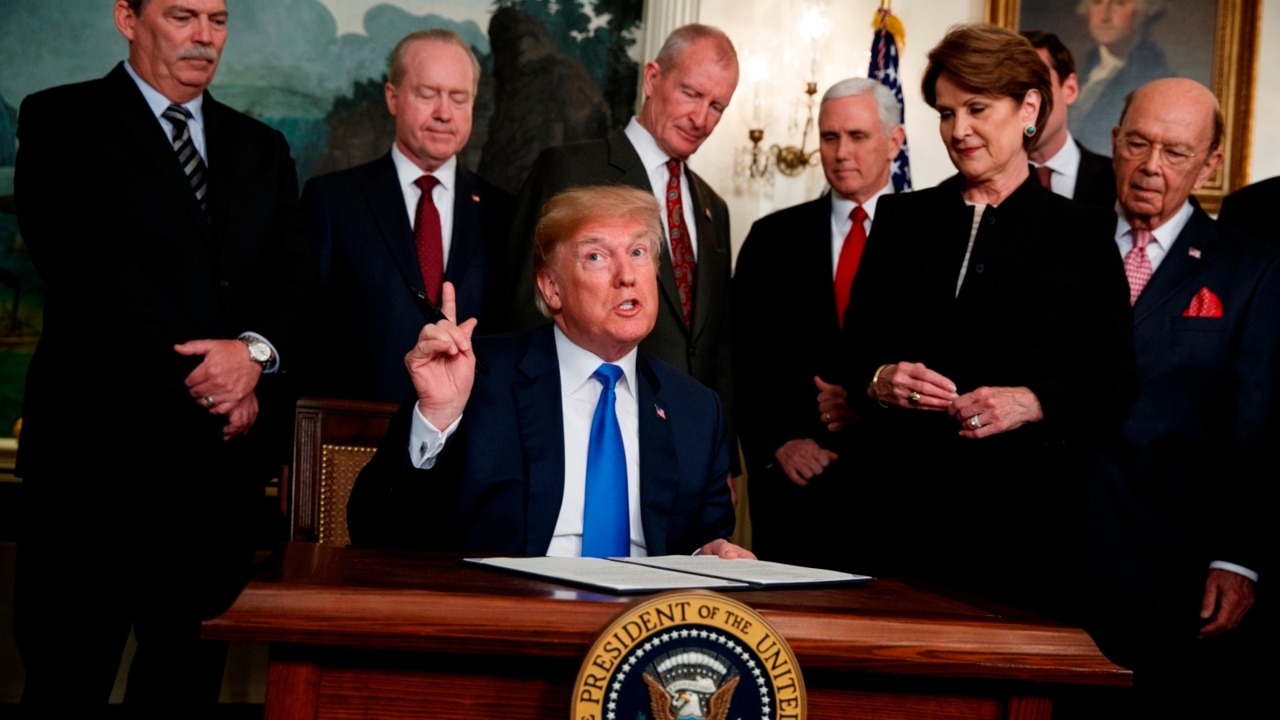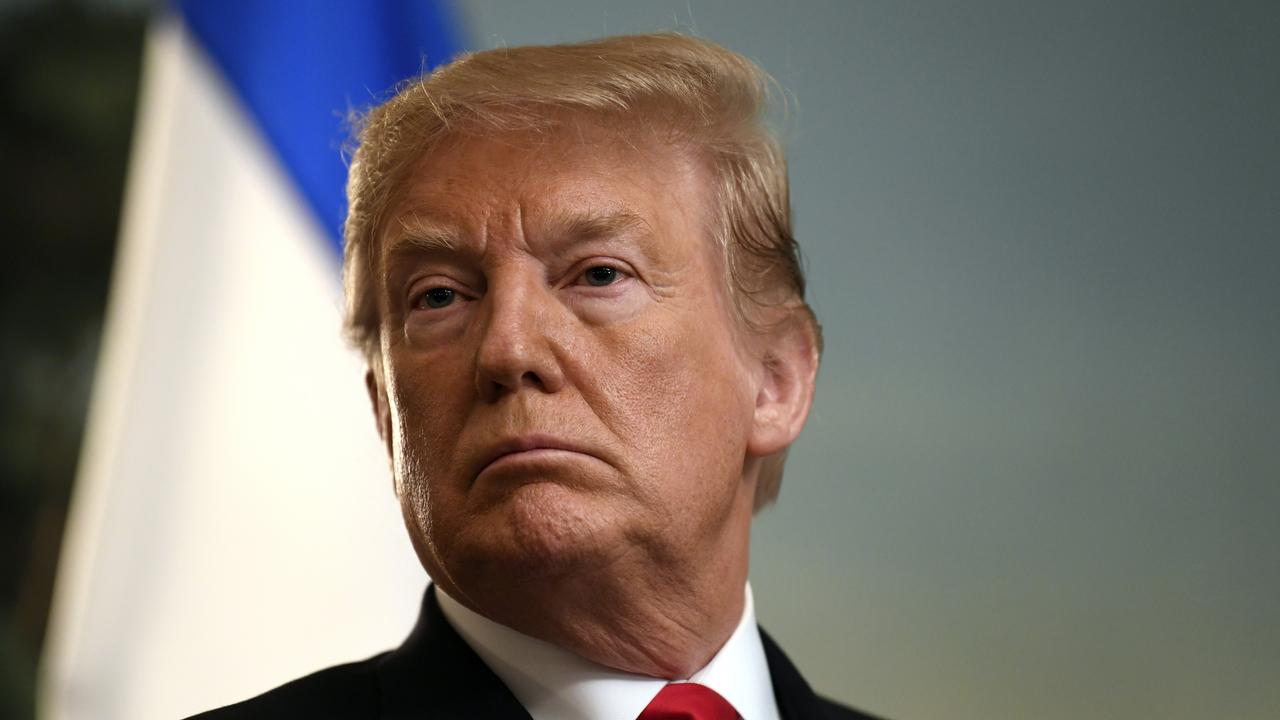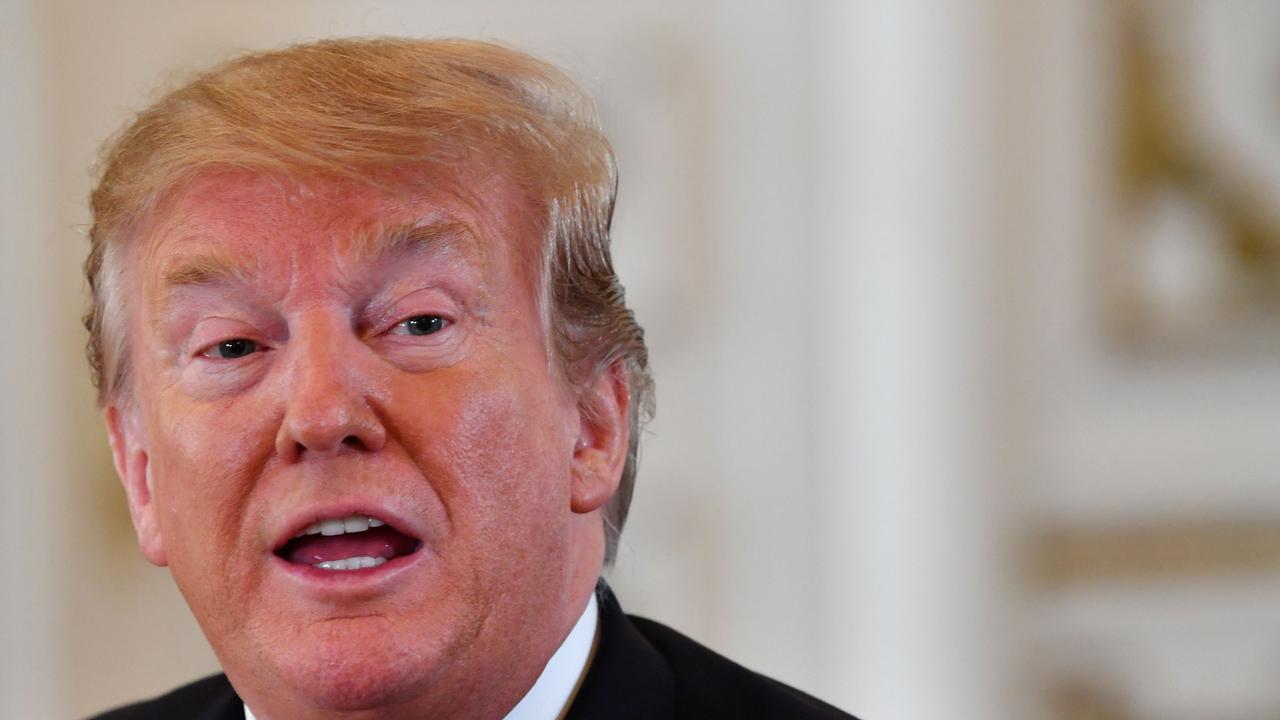Australia to get import quotas, tariff exemption ‘only temporary’
US to slap quotas on Australian steel, aluminium, and the tariff exemption granted Malcolm Turnbull is for now only temporary.

UPDATE: Donald Trump’s senior trade policy adviser says Australia will face quotas on its steel and aluminium exports to the US to ensure that no third country tries to gain a backdoor entry to American markets.
Peter Navarro, director of the White House National Trade Council also said the countries that are exempted from the new tariffs on steel and aluminium imports to the US would only be given a temporary exemption until a more permanent arrangement could be reached.
The exemption would only last until May 1 “pending discussions of satisfactory long-term alternative means to address the threatened impairment to US national security”, the White House said.
“By May 1, 2018, the President will decide whether to continue to exempt these countries from the tariffs, based on the status of the discussions.”
The quotas — which will be applied to all those countries with exemptions — are unlikely to impact on Australia given the relatively low volumes of steel and aluminium exports to the US.
However Australia has not been told what level quotas might be set at.
The measures are directed more at the other larger counties that have been exempted.
US Trade Representative Robert Lighthizer said earlier today that Australia, Europe, South Korea, Canada, Mexico, Argentina and Brazil would initially escape America’s 25 per cent steel and 10 per cent aluminium tariffs that come into force tomorrow.
“Here’s what’s going to happen,” Mr Navarro said. “They’re temporary exemptions conditioned on the ability of these countries to come to the table and give us more fair and reciprocal trade.”
He said Australia and other exempted nations will be given steel and aluminium quotas to prevent non-exempted nations attempting find backdoor entry points to America.
“This is an important thing,” Mr Navarro said. “Every country that is not facing tariffs that we are going to negotiate with will face quotas so that we protect our aluminium and steel industries.”
“For all countries there has to be a quota. If you don’t put a quota on, then any country that can do whatever they want will become a trans-shipment point for any other country.”
Australia’s peak body representing the steel industry says it’s too early to tell what the impact will be.
“I don’t think until the details come out that we really know what the implications of what he is announcing or is not announcing,” Steel Institute chief executive Tony Dixon said.
China to target farm belt
China has announced a list of US goods including pork, apples and steel pipe on which it might raise tariffs in the escalating trade dispute with the US.
The China Commerce Ministry called on Washington to negotiate a settlement to the conflict over higher US import duties on steel and aluminium but set no deadline.
Beijing’s move appeared to be a calculated step aimed at increasing domestic American pressure on Mr Trump by making clear which exporters, especially farming areas that supported the president in the 2016 election, might be hurt. The dispute has weighed on global financial markets amid concern it could spiral into a damaging round of retaliatory import controls by governments worldwide. The higher American duties on aluminium and steel have little impact on China, which exports only a small amount of those products to the United States. But private sector analysts have said Beijing would feel obligated to take action to avoid looking weak in a high-profile dispute.
The country’s top economic official, Premier Li Keqiang, earlier appealed to Washington to “act rationally” and said, “we don’t want to see a trade war.” The Commerce Ministry said the higher US tariffs “seriously undermine” the global trading system. It rejected Trump’s contention they are needed to protect U.S. national security.
“The Chinese side urges the U.S. side to resolve the concerns of the Chinese side as soon as possible,” the ministry said. It appealed for dialogue “to avoid damage to overall Chinese-U.S. co-operation.” Beijing reported a trade surplus of $275.8 billion with the United States last year, or two-thirds of its global total. Washington reports different figures that put the gap at a record $375.2 billion.
US authorities also are investigating whether Beijing improperly compels foreign companies to hand over technology in exchange for market access, which could lead to still more trade penalties.
Goods targeted for possible higher tariffs in Friday’s list include pork and aluminium scrap. They would receive a 25 per cent duty increase, mirroring Mr Trump’s 25 per cent tariff hike for steel.
The Commerce Ministry said China bought about $2 billion worth of those goods last year.
A second list targeted for 15 per cent duties, the level of Trump’s charge on aluminium, includes wine, apples, ethanol and stainless steel pipe. The ministry said Chinese purchases of those goods last year were about $1 billion. On Tuesday, the Chinese premier promised at a news conference that Beijing will “open even wider” to imports and investment as part of efforts to make its economy more productive.
Mr Li said that included eliminating tariffs on drug imports. But he gave no other details and it was unclear whether the planned changes might mollify Washington, the European Union and other trading partners that complain China improperly blocks access to its markets and subsidises exports.
China will “fight to the end” in trade war
China will “fight to the end” in a trade war initiated by Washington, the Chinese embassy in Washington has declared.
In a strongly worded statement, the embassy said it was “strongly disappointed” in Donald Trump’s decision to slap $US60bn ($AUD77bn) of new tariffs on Beijing, and would not recoil from a trade war.
“If a trade war were initiated by the US, China would fight to the end to defend its own legitimate interests with all necessary measures,” the embassy said.
Trade war looms over $60bn tariffs
A trade war between the US and China appears imminent after Donald Trump today announced $US60 billion of new tariffs on Beijing.
Declaring that the move would make America a stronger, richer nation, the president said; “We’re doing things for this country that should have been done for many, many years.”
The tariffs will effectively block $US60 billion ($AU77bn) worth of Chinese goods from entering the US and is likely to provoke a retaliation from China on US agricultural imports which could hurt US farmers.
Wall St’s Dow Jones index plummeted by almost 400 points or 1.6 per cent as investors responded nervously to the tariffs announcement amid fears it would push up the price of consumer goods in the US and limit American exports to China.
The move came as US Trade Representative Robert Lighthizer today confirmed that Australia would be exempted from the administration’s new steel and aluminium tariffs which come into force from tomorrow.
President Trump has decided to “pause the imposition of the tariffs with respect to those countries,” Mr Lighthizer told the Senate Finance Committee. “We have the two NAFTA countries. We have Europe, Australia, we have Argentina, we have Brazil, and obviously Korea.”
Mr Trump said the new tariffs on China were in response to the ‘tremendous intellectual property theft’ by Beijing which cost the US hundreds of billions of dollars annually.
The tariffs are likely to be imposed on around 1300 targeted Chinese products which the administration says will focus on the technology which China has taken from US companies.
“What you’ll see is that many of these areas are those where China has sought to acquire advantage through the unfair acquisition or forced technology transfer from US companies with an aim toward establishing its own competitive advantage,” said Everett Eissenstat, deputy director of the White House National Economic Council.
Mr Trump said America’s $US375 billion trade deficit with China was “the largest deficit of any country in the history of our world.’
“I really believe they cannot believe they have gotten away with this for so long,” he said.
He called on China to reduce its trade deficit by $US100 billion “immediately” and said the US was negotiating with Beijing at the moment on what China could do.
“We are in the midst of a very large negotiation, we’ll see where it takes us,” he said.
The president said he was adopting a “reciprocal” approach to US trade with China.
“The word is reciprocal — if they charge us, we charge them the same thing. For many decades it has not been that way.”
The new tariffs will be the third set of Trump tariffs to hit China after the new steel and aluminium tariffs and the tariffs on washing machines and solar products announced earlier this year.
Cameron Stewart is also US Contributor for Sky News Australia
Additional reporting: AAP








To join the conversation, please log in. Don't have an account? Register
Join the conversation, you are commenting as Logout